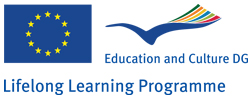|
REPORTS - GERMANY - 2nd report

Cultural
Vehicles in Education - assisting the needs of vulnerable
social groups

Die Wille gGmbH
15.04.2008
Pilot workshops. Please describe the profile of
the group and the recruitment process
Since the last report, dated 15.02.08, the group of participants
has consolidated more and more. Some participants did not
attend all the workshop dates, caused by illness or by
job-related reasons. The participation is voluntary. In
the last workshop "Storytelling" some new persons
joined it. The new participants were recruited from other
projects run by Die Wille gGmbH, similar to the one which
is described in the 1st report. For the 2-weeks workshop
in May (19.-30.) we will recruite some other participants,
because not all of the existing group will be able to attend.
Please describe the main activities
taken at this stage of the project
Between the last report from 15. February and this stage
of the project the learners have participated in the following
activities/ workshops with the themes:
1. "About anger, angry children
and the anger in ourselves."
2. "About the interrelation of
emotions and intellect".
3. "Learning to understand the
chances but also the limitations of child-rearing."
4. "Solving communication problems by
using irony, comic and absurd behavior" - Excursion to
an exhibition of the German poet, musician, actor and film
director Karl Valentin (1882-1948).
1. - 4. have been one day workshops.
5. "Oral history and storytelling:
From Fairy Tales to Rap", a four-days' workshop.
For more details see revised Course Program, workshops
Nr. 3 to 7, Attachment 1;and the attachments 2-10.
Please describe any problems or
difficulties at this stage of the project and the actions
taken to overcome them
There were not serious problems in the last two month.
In what way did the educational and artistic activities interact? Please give
some specific examples.The learner-centered creative approach of the workshops
is always based on the needs of the participants. For example in Workshop
4 "About the Interrelation of Emotions and Intellect (How to Set and
Respect Borders)", the participants discussed problems regarding this
topic in their every day life in using texts from literature (e.g. poems
from Goethe and other authors) and music (e.g. a song by Hildegard Knef).
Special situations were transformed into little scenes, which were performed
by the participants. In the interactive learning process the participants
learned to respect the emotions and thoughts of the others, the personal
perspective is broadened, the competence to give positive feedback is enhanced.
The mood in the group is becoming more relaxed, confidential and respectful.
Fears to open one self are minimized.
How did the arts-based educational
activities help the participants to:
a) acquire certain competences and skills
b) facilitate knowledge assimilation (learning
specific information)Please give some specific examples.
a.) By performing and reciting in front
of the group poems and fables, little stories written by
them selves, pieces from mythology and fairy tales the
participants acquired skills how to present themselves,
to discuss and declare their decisions, enhanced their
capacity for verbal and non-verbal expression. This process
gave them self-esteem and a better insight into their own
competences and how to use them.The art based activities
helped especially those participants, who are not used
to debating in an academic, theoretical way. Every participant
could feel he or she was contributing interesting aspects
and individual experience to the process.The participants
often utilized team- and partner-work to prepare and perform
their tasks. This helped them to enhance their awareness
and respect for the other group members and the strength
of each individual person.
b.) The participants learned a lot about
cultural heritage, from the classic myths to fables, fairy
tales and literature of different decades. Also modern poetry,
like in pop songs and rap texts was used for thematic discourse.
They gained basic knowledge in the fields of psychology, conflict
management, communication matters, children's education and
language promotion.
Please reflect on progress made
by individual persons (for example, increased motivation
of a reluctant learner or better social skills of a shy
participant).
The positive feeling and the atmosphere of safety in the
group, which was often verbalized by the participants in
the open feedback-round, made it possible, that even shy
people acquired enough self-confidence to speak freely
in front of the whole group about their personal problems,
fears, dreams and weakness. Some people, who had refused
any kind of performing at the beginning of the course eventually
found great pleasure in acting and telling stories.Some
persons who were frightened to risk a conflict situation
by criticizing a dominant member of the group, gained enough
self-confidence to do this in a considerate way the other
person could accept.Two participants with severe physical
handicaps (epilepsy and severe rheumatism) developed managerial
skills in the sense that they animated other more hesitating
people to take part in the activities. They became esteemed
and supported members of the group.In expressing themselves
they proved to be very creative and inventive.
|